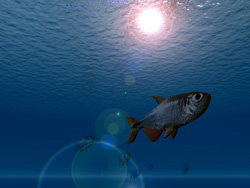Understanding and protecting marine ecosystems
Increasing pressures on marine biodiversity due to human activities and climate change threaten marine ecosystems in ways as yet poorly understood. The EU-funded ‘Marine biodiversity and ecosystem functioning’ (Marbef) project set out to establish a network of excellence, a virtual European institute integrating and disseminating knowledge and expertise regarding marine ecosystems. The researchers focused on patterns and structures of species’ diversity as well as socioeconomic consequences of changes in these biodiversity markers. The researchers highlighted the importance of cold water caves and geothermal vents in understanding marine biodiversity. Cold water caves are cold, dark environments with minimal food supplies, making them easily accessible, appropriate models for the deep sea. Hydrothermal vents are interesting localised marine environments created by water seeping through the Earth’s crust, absorbing metals and minerals and becoming heated by the Earth’s magma to erupt through cracks as super-heated, mineral rich geysers. Given the extreme conditions associated with cold water caves and vents, organisms living here show unusual adaptations for survival. The investigators identified factors related to human activity that put pressure on marine ecosystems. Among them were resource overexploitation (such as over fishing), pollution and activity-induced climate change, habitat destruction and introduction of species normally not present in a given ecosystem. Contrary to expectations, warming of environments actually led to increased biodiversity in certain areas. However, changes in biodiversity (the variety of organisms present) were less important to ecosystem function than changes in key species’ abundance (increased or decreased populations). The Marbef project also developed a decision support system (MarDSS) for use by researchers, industry and policymakers for identifying and evaluating alternatives for the protection of marine biodiversity. Furthermore, the consortium highlighted vague areas in existing marine biodiversity information that should be clarified with future research. In summary, the network of excellence established by EU funding to the Marbef project produced important knowledge related to marine biodiversity and ecosystem functioning, as well as tools for evaluating sustainable alternatives. The project should have significant positive impact on future marine biodiversity research, on sustainable practices and on the future of marine ecosystems that are part of the waters covering over 70 % of the Earth’s surface.







